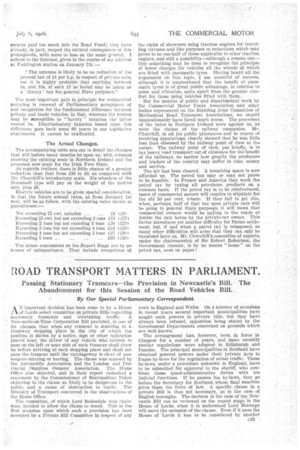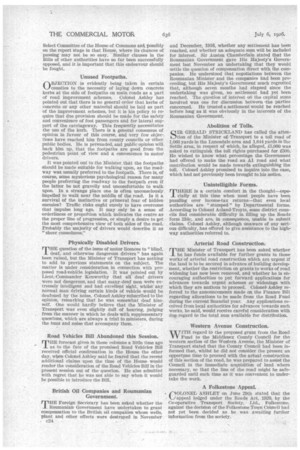ROAD TRANSPORT MATTERS IN PARLIAMENT.
Page 13

Page 14

If you've noticed an error in this article please click here to report it so we can fix it.
Passing Stationary Tramcars—the Provision in Newcastle's Bill. The Abandonment for this Session of the Road Vehicles Bill.
By Our Special Parliamentary Correspondent.
AN important decision has been come to by a House of Lords select committee on private Bills regarding stationary tramcars and overtaking • traffic. A Newcastle-on-Tyne Corporation Bill provided, in one of its clauses, that when any tramcar is Standing at a tramway stopping place in the city of which the position is shown by a notice, sign or other indication placed near, the driver of any vehicle who intends to pass on the left pr near side of such tramcar shall draw up before arriving at such stopping place and shall not pass the tramcar until the carriageway is clear of passengers entering or leaving: The clause was ramose(' by the Automobile Association and the London and Provincial Omnibus Owners', Association. The Horne Office also Objected, and in their report embodied a statement by the Commissioner of Metropolitan Police objecting to the clause as likely to be dangerous to the public and a cause of obstruction to traffic. The Ministry of Transport concurred in the observations of the Home Office.
The committee, of which Lord •Redesdale was chairman, decided to allow the clause to stand. This is the first occasion upon which such a provision has been accepted by' a Private Bill Committee in respect of any town in England and Wales. On a number of occasions in recent years several important municipalities have sought such powers in private bills, but they have always been refused, opposition being stated by the Government Departments concerned on grounds which are well known.
The arrangement has, however, been in force in Glasgow for a number of years, and more recently similar regulations were adopted in Edinburgh and Dundee. The principal municipalities in Scotland have obtained general powers under their private Acts to frame by-laws for the regulation of street traffic. These by-laws, under a procedure unknown in England, have to be submitted for. approval to the sheriff, who combines these quasi-administrative duties with his judicial functions. If he passes the by-laws, they go before the Secretary for Scotland, whose final sanction gives them the force of law. A specific, clause in a private Bill is thus not necessary, as in the case of English boroughs. The decision in the case of the Newcastle Bill can be reviewed on the report stage in the House of Lords, when it is understood Lord Montagu will move the omission of the clause. Even if it pass the House of Lords it has to be considered by another
Select Committee of the House of Commons an& possibly on the report stage in that House, where its chances of passing may not be so easy. Similar clauses in the Bills of other authorities have so far been successfully opposed, and it is important that this endeavour should be fought.
Unused Footpaths. O(ABJECTION is evidently being taken in certain counties to the necessity of laying down concrete kerbs at the side of footpaths on main roads as a part of road improvement schemes. Colonel Ashley has pointed out that there is no general order that kerbs of concrete or any other material should be laid as part of the improvement schemes, but it is his policy to require that due provision should be made for the safety and convenience of foot passengers and for lateral support of the carriageway. This frequently necessitates the use of the kerb. There is a general consensus of opinion in favour of this course, and very few objections have reached him from county councils or other public bodies. He is persuaded, and public opinion will back him up, that the footpaths are good from the pedestrian point of view and a convenience to motor drivers. It was pointed out to the Minister that the footpaths should be made suitable for walking -upon, as the roadway was usually preferred to the footpath. There is, of course, some mysterious psychological reason for many people preferring the roadway to the footpath even if the latter be not gravelly and uncomfortable to walk upon. In a strange place one is often unconsciously impelled to walk near the middle of the road. Is it a survival of the instinctive or primeval fear of hidden enemies? Traffic risks ought surely to have overcome that impulse long ago. It may only be a sense of orderliness or proportion which indicates the centre as the proper line of progression, or simply a desire to get the most comprehensive view of both sides of the road. Probably the majority of drivers would describe it as "sheer cussedness."
Physically Disabled Drivers.
T"question of the issue of motor licences to " blind, deaf, and otherwise dangerous drivers' has again been raised, but the Minister of Transport has nothing to add to previous statements on the subject. The matter is under consideration in connection with proposed road-vehicle legislation. It was pointed out by Lieut.-Commander Kenworthy that all deaf drivers were not dangerous, and that many deaf men were extremely intelligent and had excellent sight, whilst any normal man driving certain kinds of vehicle would he deafened by the noise. Colonel Ashley subscribed to the opinion, remarking that he was somewhat deaf himself. One would hardly believe that the Minister of Transport was even slightly dull of hearing, judging from the manner in which he deals with. supplementary questions, which are always a trial to ministers, during the buzz and noise that accompany them.
Road Vehicles Bill Abandoned this Session. THE forecast given in these columns a little time ago as to the fate of the promised Road Vehicles Bill received official confirmation in the House the other day, when Colonel Ashley said he feared that the recent additional claims upon the time of the House would render the consideration of the Road Vehicles Bill in the present session out of the question. He also admitted with regret that he was not able to say when it would be possible to introduce the Bill.
British Oil Companies and Roumanian Government.
THE Foreign Secretary has been asked whether the Roumanian Government have undertaken to grant compensation to the British oil companies whose wells, plant and other effects were destroyed in November
c24
• and December, 1916, whether any settlement has been reached, and whether an adequate sum will be included for interest. Sir Austen Chamberlain stated that the Roumanian Government gave His Majesty's Government last November an undertaking that they would settle the question of compensation direct with, the companies. He understood that negotiations between the Roumanian Minister and the companies had been proceeding, but His Majesty's Government much regretted that, although seven months had elapsed since the undertaking was given, no settlement had yet been reached. The question of interest on the capital sums involved was one for discussion between the parties concerned. He trusted a settlement would be reached before long as it was obviously in the interests of the Roumanian Government.
Abolition of Tolls.
SIR GERALD STRICKLAND has called the attention of the Minister of Transport to a toll road of 1,006 yards in the Lunesdale area and 1,644 yards in the Settle area, in respect of which, he alleged, £5,000 was asked to extinguish the toll rights purchased for £500. He wished to know what percentage the Government had offered to make the road an Al road and what contribution would be made towards extinguishing the toll. Colonel Ashley promised to inquire into the case, which had not previously been brought to his notice.
Unintelligible Forms.
rpHERE is a certain comfort in the thought---espe cially at this time when most people have been puzzling over income-tax returns—that even local authorities are " stumped " by Departmental forms. According to Colonel Aciand-Troyte, some district councils find considerable difficulty in filling up the Roads form 234c, anti are, in consequence, unable to submit claims. Colonel Ashley, although unaware of any serious difficulty, has offered to give assistance to the highway authorities referred to.
Arterial Road Construction: TE Minister of Transport has been asked whether he has funds available for further grants to those works of arterial road construction which are urgent if the land is to be secured in advance of building development, whether the restriction on grants to works of road widening has now been removed, and whether he is encouraging authorities to put forward applications for advances towards urgent schemes or widenings with which they are anxious to proceed. Colonel Ashley referred to the announcements made on the Finance Bill regarding allocations to he made from the Road Fund during the current financial year. Any applications received from local authorities for advances towards such works, he said, would receive careful consideration with due regard to the total sum available for distribution.
Western Avenue Construction.
TNproposed 11TH regard to the prop grant from the Road Fund to the Middlesex County Council for the western section of the Western Avenue, the Minister of Transport stated that the County Council had been informed that, whilst he did not consider the present an opportune time to proceed with the actual construction of this section of the road, he was prepared to assist the Council in the immediate acquisition of land where necessary, so that the line of the road might be safe-guardeduntil such time as it was convenient to undertake the work.
A Folkestone Appeal.. COLONEL ASHLEY on June 29th stated that the appeal lodged under the Roads Act, 1920, by the Co-operative Transport Society, Ltd., Folkestone, against the decision of the Folkestone Town Council had not yet been decided as he was .awaiting further information from the society.
















































